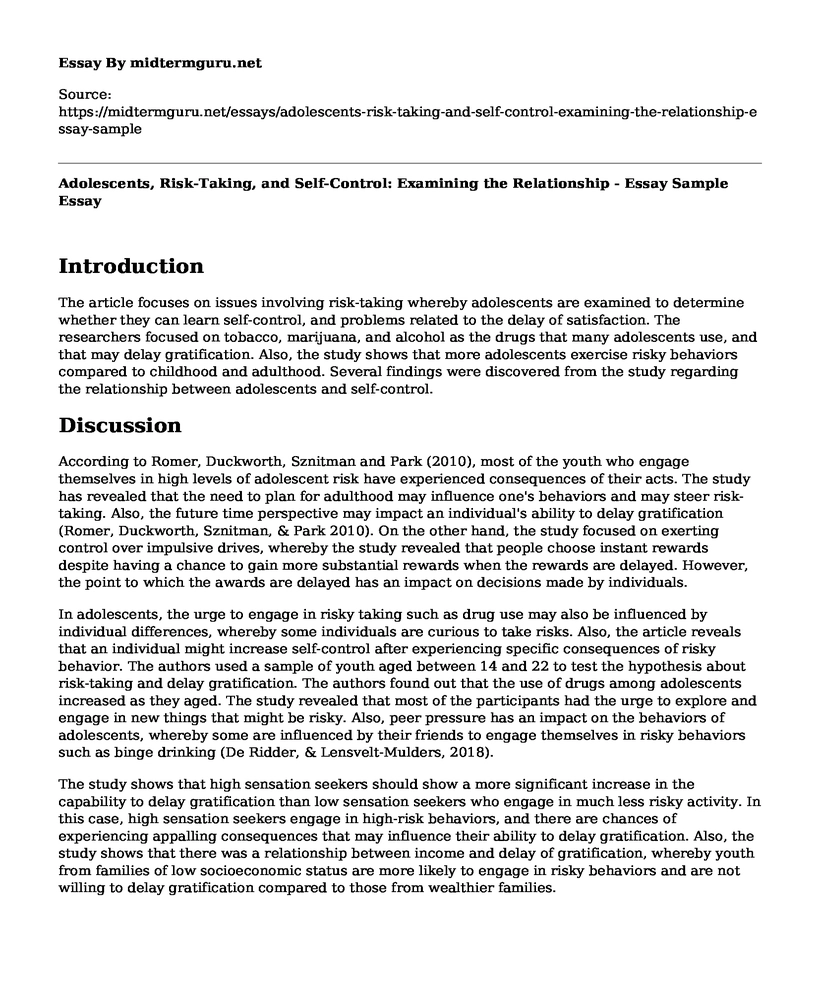Introduction
The article focuses on issues involving risk-taking whereby adolescents are examined to determine whether they can learn self-control, and problems related to the delay of satisfaction. The researchers focused on tobacco, marijuana, and alcohol as the drugs that many adolescents use, and that may delay gratification. Also, the study shows that more adolescents exercise risky behaviors compared to childhood and adulthood. Several findings were discovered from the study regarding the relationship between adolescents and self-control.
Discussion
According to Romer, Duckworth, Sznitman and Park (2010), most of the youth who engage themselves in high levels of adolescent risk have experienced consequences of their acts. The study has revealed that the need to plan for adulthood may influence one's behaviors and may steer risk-taking. Also, the future time perspective may impact an individual's ability to delay gratification (Romer, Duckworth, Sznitman, & Park 2010). On the other hand, the study focused on exerting control over impulsive drives, whereby the study revealed that people choose instant rewards despite having a chance to gain more substantial rewards when the rewards are delayed. However, the point to which the awards are delayed has an impact on decisions made by individuals.
In adolescents, the urge to engage in risky taking such as drug use may also be influenced by individual differences, whereby some individuals are curious to take risks. Also, the article reveals that an individual might increase self-control after experiencing specific consequences of risky behavior. The authors used a sample of youth aged between 14 and 22 to test the hypothesis about risk-taking and delay gratification. The authors found out that the use of drugs among adolescents increased as they aged. The study revealed that most of the participants had the urge to explore and engage in new things that might be risky. Also, peer pressure has an impact on the behaviors of adolescents, whereby some are influenced by their friends to engage themselves in risky behaviors such as binge drinking (De Ridder, & Lensvelt-Mulders, 2018).
The study shows that high sensation seekers should show a more significant increase in the capability to delay gratification than low sensation seekers who engage in much less risky activity. In this case, high sensation seekers engage in high-risk behaviors, and there are chances of experiencing appalling consequences that may influence their ability to delay gratification. Also, the study shows that there was a relationship between income and delay of gratification, whereby youth from families of low socioeconomic status are more likely to engage in risky behaviors and are not willing to delay gratification compared to those from wealthier families.
Conclusion
To conclude, adolescents face various challenges that may be the leading cause of engaging in risky behaviors. Also, peer pressure has an impact on the actions of multiple individuals, whereby most of the youth participate in drug use due to peer pressure, and this may influence their ability to delay gratification. From the article, one can learn how adolescent is characterized by experimenting, and this leads many adolescents to engage in risky behaviors. Also, self-control varies among individuals based on one's character; however, one's experience after being involved in a particular activity might influence the ability to have self-control.
References
De Ridder, D. T., & Lensvelt-Mulders, G. (2018). Taking stock of self-control: A meta-analysis of how trait self-control relates to a wide range of behaviors. In Self-Regulation and Self-Control (pp. 221-274). Routledge.
Romer, D., Duckworth, A. L., Sznitman, S., & Park, S. (2010). Can adolescents learn self-control? Delay of gratification in the development of control over risk taking. Prevention science, 11(3), 319-330.
Cite this page
Adolescents, Risk-Taking, and Self-Control: Examining the Relationship - Essay Sample. (2023, Feb 09). Retrieved from https://midtermguru.com/essays/adolescents-risk-taking-and-self-control-examining-the-relationship-essay-sample
If you are the original author of this essay and no longer wish to have it published on the midtermguru.com website, please click below to request its removal:
- Literary Analysis Example on Social Classes in the Play "Pygmalion"
- Social Group Analysis Project
- How Social Media Affects Relationships? - Essay Sample
- The Great Disparity: 30 yrs of Middle Class Perfection Shattered - Essay Sample
- E-Mails: Redefining Human Communications & Interactions - Essay Sample
- Friends: Our Essential Need for Companionship - Essay Sample
- Mail Etiquette: Understanding Tone and Proofreading Before Sending - Essay Sample







